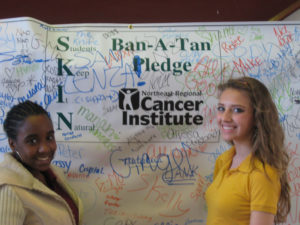Cancer Prevention
Did you know that there are steps you can take now to reduce your cancer risk for years to come? While major risk factors for cancer, such as aging and family history, obviously cannot be altered, there are lifestyle choices you can make to lessen your likelihood for developing this disease.
Eliminate Tobacco Use
Eliminate Tobacco Use
The single most impactful thing that a person can do to reduce their cancer risk is to avoid tobacco use. The use of cigarettes, pipes, cigars, and chewing tobacco are linked to many different types of cancer. Although quitting can be difficult, there are resources available to help guide tobacco users through the process. Visit our Tobacco Cessation Resources page to learn more about some helpful organizations.
Healthy Diet and Exercise
Remaining active through regular exercise and maintaining a healthy diet are two other behaviors that can reduce your cancer risk. When starting an exercise program, it is a good idea to consult your healthcare provider, choose activities that you enjoy, and start slowly before gradually increasing your regimen. In terms of diet, plant-based foods are especially important to include as they are associated with reducing the risk of colorectal cancer as well as obesity, which is a risk factor linked to some cancers. Choosing whole grains and lean protein is likewise important, and if you choose to consume alcohol, you should do so only in moderation.
Stay Up-To-Date on Cancer Screenings
Cancer screenings are medical tests performed on individuals with no symptoms of cancer. The purpose of screening tests is to find early stage cancers before they progress to a level where symptoms become apparent and the cancer becomes harder to treat. For more information about cancer screenings, please click here.
If you are uninsured or underinsured, the Cancer Institute may be able to help you get the cancer screenings you need. The Cancer Institute Patient Navigation program works with low income individuals who are not up to date with breast, cervical, colon and lung cancer screenings. For more information on this program, please click here.
Sun Safety
Another factor that is important in regards to cancer risk is sun exposure. In fact, by taking proper precautions, the risk of skin cancer can be significantly reduced. As often as possible, you should avoid direct sun exposure, especially from 10 a.m. to 2 p.m. Wearing sunglasses, sunscreen, and protective clothing should also be a part of your regular protective measures. Artificial tanning devices should be avoided.
More information about cancer prevention can be found by contacting the Cancer Institute.

